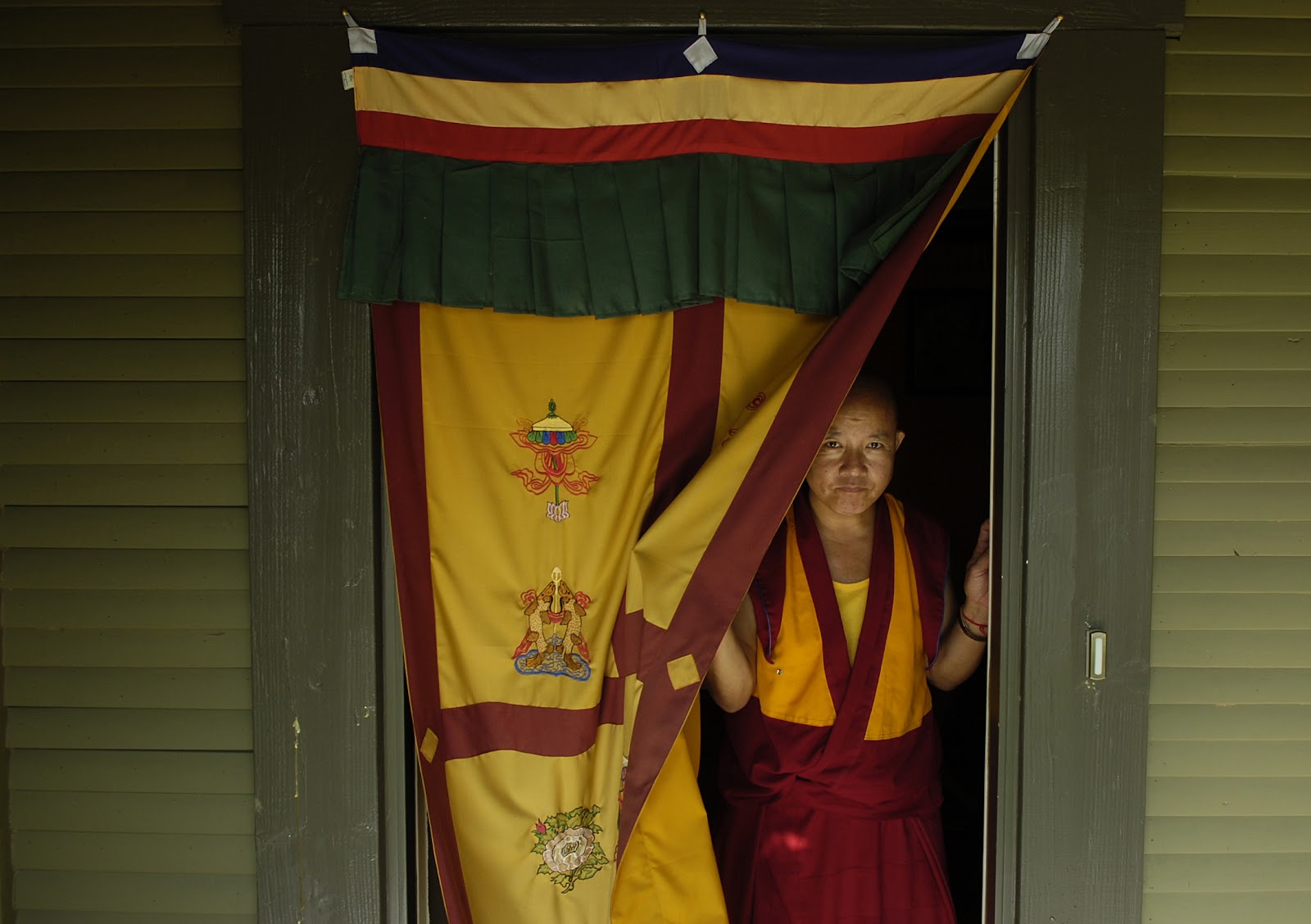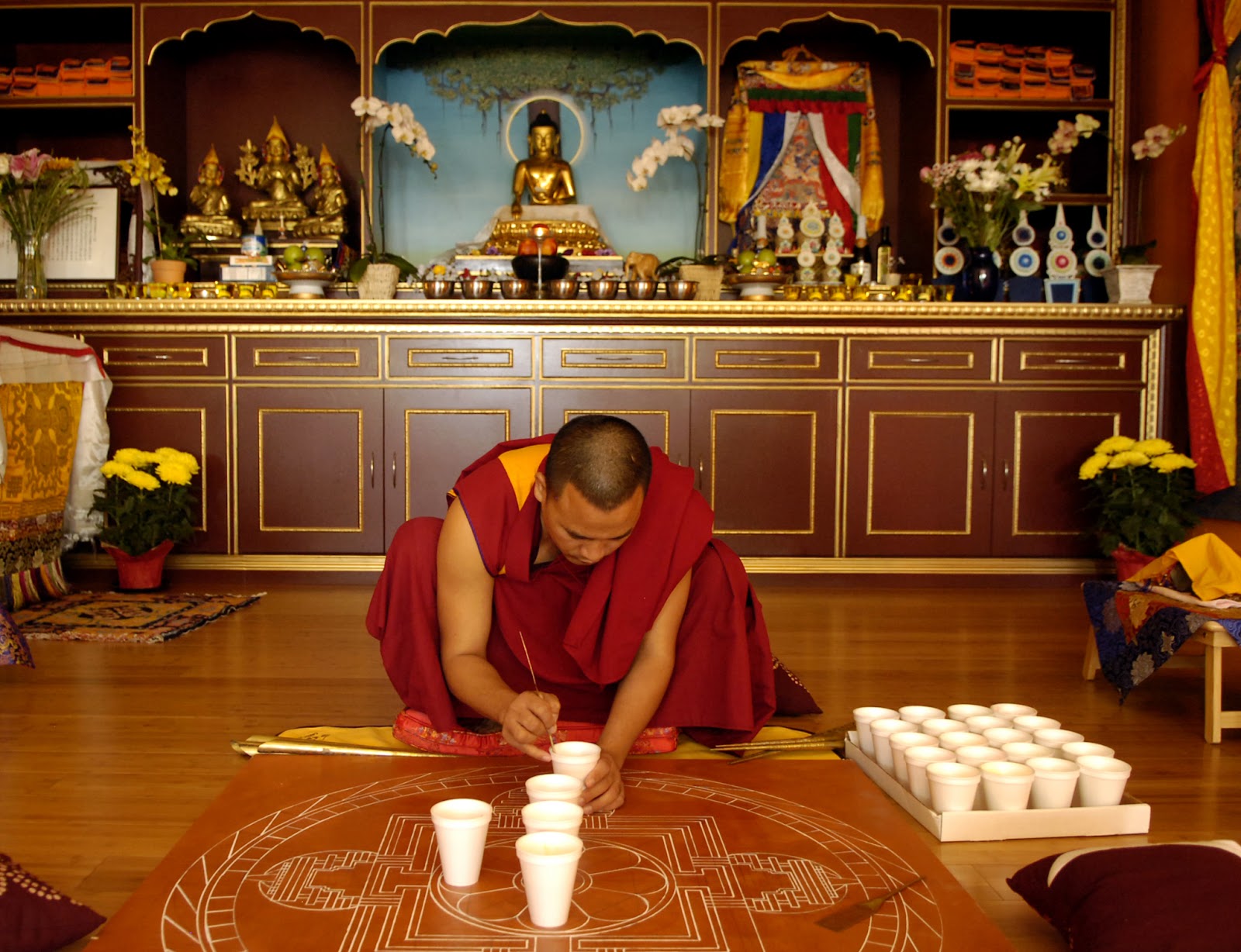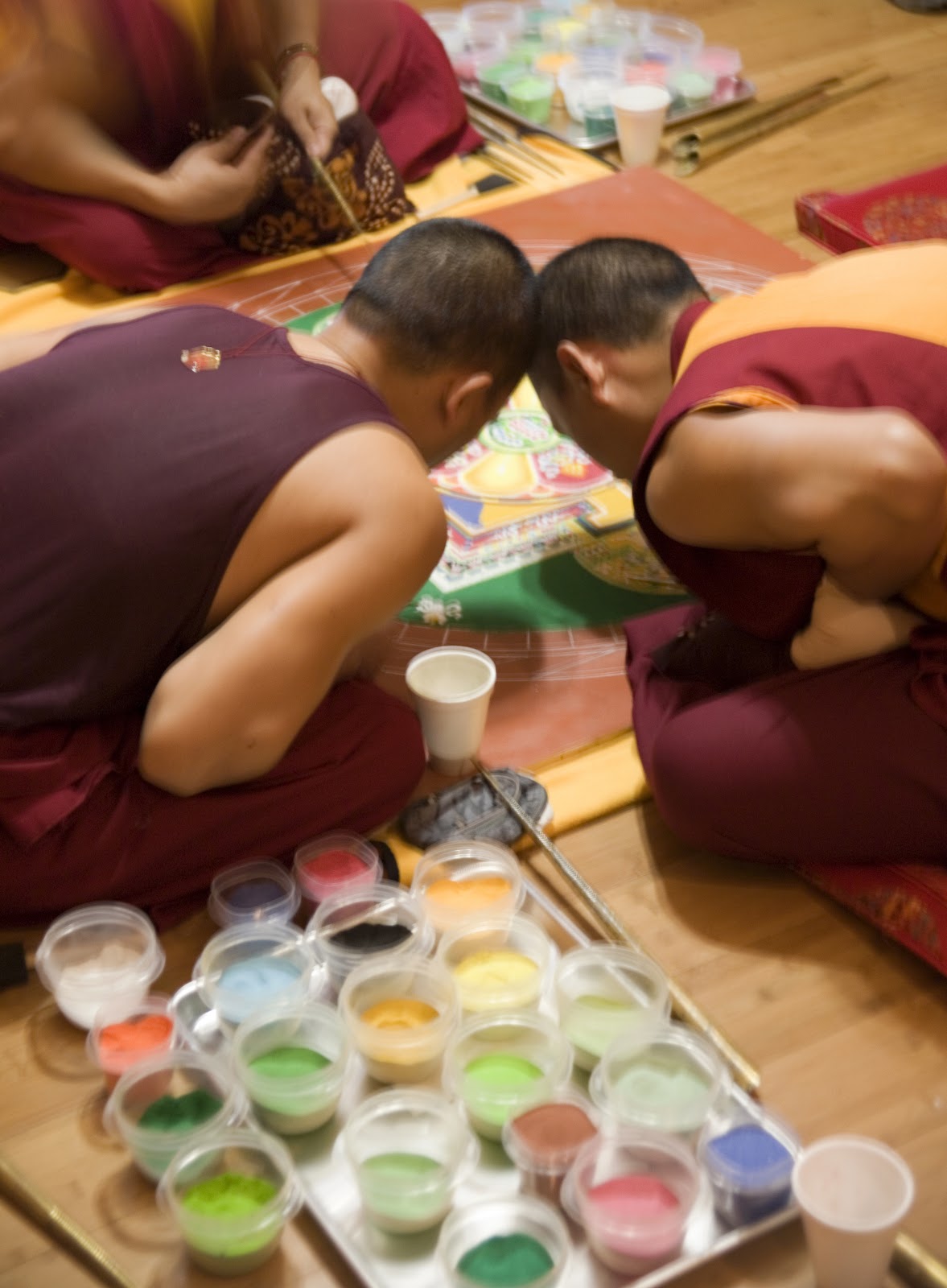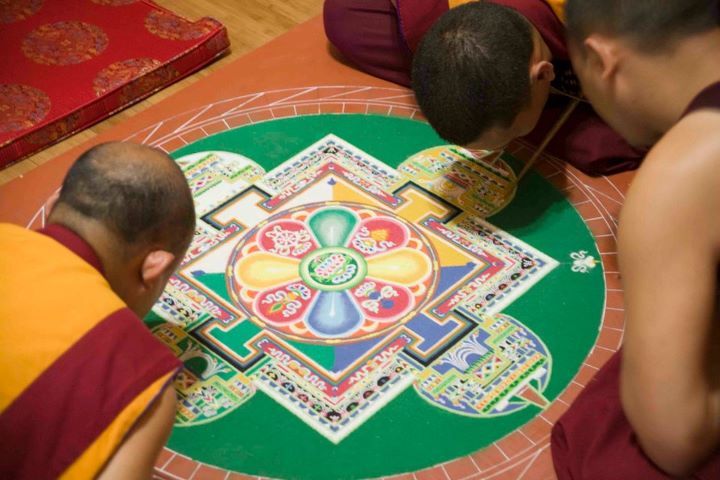Buddhist Monks spend a week in Pomona creating peace-and-compassion mandala sand painting
A whisper of a breeze blew gently into the room at the Land of Enlightened Wisdom Buddhist Center in Pomona, fluttering over closed eyes of those breathing quietly and waiting for a sacred ceremony to begin.
The silence lifted as seven Tibetan monks from the Gaden Jangste Monastery in India began to chant a mantra (prayer). The low rumbling resonance of their voices penetrated the quiet as the monks prepared themselves and purified a simple space so peace prevails.
No one physically touched another, but the minds and spirits of the monks quickly and non-dramatically linked with others present.
The monks, led by renowned physician and revered teacher (geshe) Dorji Wangchuk, slipped into deep meditation as their chants harkened Avalokiteshavara - the compassionate Buddha - and sought his blessings on the peace-and-compassion mandala sand painting they would create at the Pomona center located at 1317 N. Park Ave.
Although they spoke no words, the melodic harmony of their chanting voices lyrically blended together. Sunlight streaming through the windows caught crimson and gold colors in the monks' robes and cast light and shadow on the intricately carved ancient Tibetan trumpets, drums, cymbals and percussions played.
The seven monks worked from early morning to evening each day for five days - Aug. 16 to 20 - and on Sunday morning, they scooped up small amounts of the sacred sand to give to those taking part in the closing ceremony. The remaining sand was cast into the water at Puddingstone Reservoir at Bonelli Park in San Dimas in the hope that water and air would carry the lesson of the compassionate Buddha to the world and create more peace, Geshe Wangchuk explained.
The seven monks - chant master Tamrin Tsering, ritual master Jigme Wangchuk, dance master Jamba Leta, Nawang Chundu, Nima Wangchuk, Kuncho Tsering and Geshe Dorji Wangchuk - arrived in the United States from Mondgod, India in late June and will tour 15 states and Canada before returning home in May.
Their visits to Buddhist, yoga and community centers, colleges, universities, churches and museums have the two-fold purpose of spreading the message of universal peace and raising funds to build another house to relieve extreme overcrowding at the monastery that is one of the three main Tibetan Buddhist monastic universities in India.
Other Southland stops include the Asian Pacific Museum in Pasadena, Sept. 7-11, and the Neighborhood Congregational Church in Laguna Beach, Sept. 21-25.
Nima Nedup of West Covina, the Tibetan-English interpreter at the Land of Compassion Buddhist Center in West Covina, serves the visiting monks as interpreter and coordinator of their national tour. The tour is sponsored by the Chokhor Gepheling Buddhist Center in Los Angeles and private contributions.
The monks will create mandalas, bless homes and businesses, conduct ritual
ceremonies and offer prayers in California, Arizona, Colorado, New Mexico, Texas, Missouri, Kansas, Pennsylvania, Indiana, Ohio, Minnesota, New York, Massachusetts, Connecticut and Washington, D.C. in the United States and Vancouver and Toronto, Canada before returning to their monastery in the Indian state of Karnataka.
Creating a mandala in Pomona at this time has special significance, noted Nedup and Geshe Tenzin Sherap, the monk and spiritual leader at the Land of Enlightened Wisdom Buddhist Center who hosted the monks' Inland Valley visit.
"This particular month commemorates the anniversary of when the Buddha began his teachings after his enlightenment," Nedup explained. "His first message was about the development of compassion. This message was first given in the sixth month on the fourth day 2,500 years ago on the Tibetan lunar calendar. August is the counterpart time on the western calendar."
Sherap said the Gaden monastery is an ancient one, founded in 1409 by Je Tsongkhapa Lobsang Dakpa, and now featuring two parts, Gaden Jangtse and Gaden Shartse. The former features 12 houses, known as khangtsens. The seven visiting monks are from Tsawa Khangtsen, one of the largest houses serving the Himalayan regions of Tibet, Arunachal Pradesh (India), Bhutan, Ladakh and Nepal.
"In the monastery there are too many monks and less room," Geshe Sherap lamented. "They must build a new monastery to expand the space because there are more than 2,000 monks there now and many most stay outside the prayer hall during gatherings because there is not enough space inside."
Each person witnessing the sacred opening ceremony in Pomona had individual reasons for attending.
Marian Hennigan of Azusa saw the Dalai Lama in San Jose in 2004 and her life and perspective were transformed by the spiritual message of His Holiness.
"It was inspiring to realize we all have the potential to change our minds and become more compassionate human beings," said Hennigan, now a student of Geshe Sherap at the Pomona center. "I began a journey after seeing the Dalai Lama and spend more time thinking of other people's well-being instead of just my own.
"In taking care of other people's needs, you're taking care of your own," she reasoned. "His Holiness says it is wise selfishness to think of other human beings because it brings you more happiness."
Dr. Valorie Thomas of Pomona, an African studies and English professor at Pomona College in Claremont, learned about the Pomona Buddhist center and visiting monks from Dr. Joyce Liu, a colleague. She was especially drawn to the Buddhist philosophy of being intentionally mindful about compassion and peace.
This is a time to focus more on the compassionate Buddha and make it real in one's personal life as well as community, Thomas contended.
"Wherever you are, whatever your understanding is, you can always learn more,"the educator charged. "I came here today to be more inspired by the mandala in this humble house. It is created with sand because sand is impermanent and constantly shifts. This sand mandala reminds us life is not permanent and we should strive today for peace and compassion because we may not be here to do so tomorrow."
Dolma, an elder and Tibetan Buddhist living in Diamond Bar, invited Sophie Morton of Diamond Bar, Susana Wang of Chino Hills and Rowland Heights residents Eugenia Chang and Jennifer Chen to see the visiting monks, meet Dr. Dorji Wangchuk who is a renowned physician and astronomer and witness the creation of the mandala.
"She always shares the Buddha with friends and family because she truly believes in compassion for all humanity," Wang said about Dolma. "Some of us met Geshe Wangchuk and other hospitable, loving Tibetan monks while on a spiritual journey in India.
"We are grateful to be here today and to share this auspicious occasion," Wang added.





